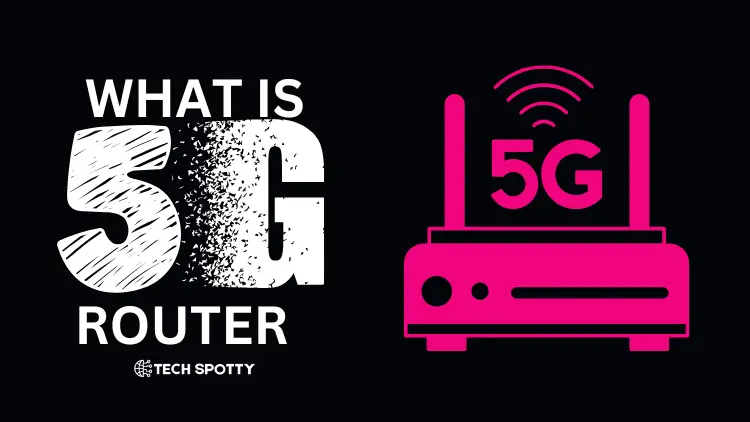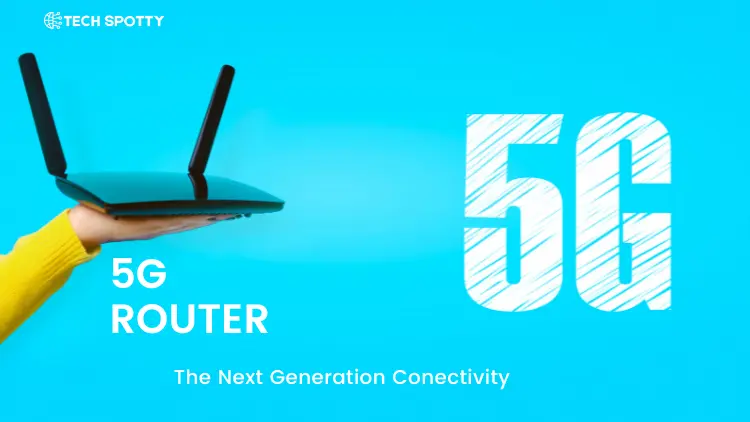5G Router | Next Generation Connectivity
A 5G router is a device that connects to the internet using 5G, the latest generation of mobile network technology. It provides super-fast internet speeds, much faster than 4G. It allows multiple devices to connect simultaneously without slowing down. This makes it perfect for streaming videos, online gaming, and other data-heavy activities. A 5G router works similarly to Wi-Fi routers. Still, it uses 5G signals to deliver internet, so it’s a great option if your home or office has 5G coverage. You can use it when regular Wi-Fi is not available, or it is not fast enough.
What is a 5g router?

A 5G router is a device that connects to the internet using 5G network technology. It provides faster internet speeds than older technologies like 4G. It connects multiple devices wirelessly, similar to a regular Wi-Fi router. The main difference is that a 5G router uses the 5G mobile network instead of a traditional internet connection through cables. This makes it ideal for high-speed internet access in places where regular wired connections may be slow or unavailable.
What are the benefits of a 5g router?
- The router has strong security features like firewalls and encryption to protect your data from hackers and keep your network safe.
- It’s very easy to set up and manage. Even if you don’t have technical skills, you can easily install, configure, and monitor the router using a web interface or mobile app.
- One of the primary advantages of using a SIM card router is the ability to access high-speed internet plans.
- 5G (Fifth Generation) gives us faster download and upload speed.
- 5G Router has a low latency.
- The 5G technology is connected to billions of devices. It has more capacity, especially in the areas of Virtual Reality(VR), the IoT (Internet Of Things), and artificial intelligence (AI).
How much faster is 5g compared to a 4g router?
| Factors | 5G | 4G |
|---|---|---|
| Latency | Less than 5 ms/td> | 60 to 98 ms |
| Potential Download Speed | 20 Gbps | 1 GBPS |
| Base Stations | Small Cells | Cell Towers |
| OFDM Encoding | 100-800 MHz channels | 20 MHz Channel |
| Goal For Self Density | 100 times greater than 4G2 | 200 to 400 Users per cell |
5G technology outperforms 4G across different key factors. With a latency of less than 5 ms compared to 60 to 98 ms for 4G, 5G provides a much quicker response time. The potential download speeds of 20 Gbps for 5G far exceed the 1 Gbps offered by 4G, enabling faster data transmission and improved user experiences. Additionally, 5G utilizes small cells for base stations, allowing for a denser network that can support 100 times more users per cell than 4G, which typically accommodates 200 to 400 users per cell using traditional cell towers. These advancements position 5G as a transformative technology that enhances connectivity, efficiency, and user satisfaction.
Why will your next industrial router be a 5g router?
Your next industrial router will likely be a 5G router because of its powerful advantages to industrial settings. First, 5G routers provide ultra fast speeds, enabling seamless data transmission for automation, IoT (Internet of Things) devices, and real-time monitoring, which is crucial for modern industries. Second, 5G networks offer low latency, meaning there is minimal delay in data exchange. This is important for processes that require quick responses, like robotics and smart machinery.
Additionally, 5G routers allow for greater connectivity by supporting many devices without slowing down, making them ideal for industries with multiple machines, sensors, and other connected equipment. They are also more flexible than wired routers, which can be deployed in remote or hard-to-reach areas without physical cables. Lastly, as 5G technology becomes more widespread, investing in a 5G router ensures that your industrial operations are future-proof, staying competitive with faster, more reliable internet.
How does a 5G Router work?
A 5G router works by connecting to the 5G mobile network to provide high-speed internet access to your devices. It uses a SIM card to connect to nearby 5G cell towers, which send and receive data quickly. Once connected, the router converts these 5G signals into Wi-Fi, allowing devices like smartphones, tablets, and laptops to connect wirelessly. This means that multiple devices can access the internet at the same time without slowing down, making it perfect for streaming, gaming, or browsing. Setting up a 5G router is usually simple; just plug it in, insert the SIM card, and follow the instructions to connect your devices. Overall, a 5G router takes fast 5G internet and shares it wirelessly with all your devices.
5G expectations vs reality
Early promises of technology don’t always come true. Organizations looking to understand the differences between 4G and 5G should first consider what 4G promised and what it delivered, as this can give insights into what to expect from 5G. It’s important to be cautious because goals often don’t match reality.
For example, 4G aimed for speeds between 100 Mbps and 1 Gbps, but users usually experienced speeds between 7 Mbps and 43 Mbps. This doesn’t mean 4G is bad; However, it lays the groundwork for what 5G intends to do. The aims of 5G, such as higher download rates and lower latency, are just increases of what 4G tried to achieve.
However, 5G hasn’t met all its goals in its early years, and it might take a long time to achieve them, or some goals may never be reached. Organizations and network teams must recognize that the expectations for 4G and 5G can differ. Still, 5G can improve operations and fix some of the issues that 4G faced. How well it does this on a global scale remains to be seen.
Bottom Line
5G routers represent a significant advancement over 4G technology, offering faster speeds, lower latency, and the ability to connect multiple devices simultaneously. While the expectations for 5G are high, and it aims to overcome some limitations of 4G, the reality is that it may take time to fully achieve these goals. Organizations should be cautious and recognize that while 5G has great potential to enhance connectivity and improve operations, the journey to realizing all its promises is ongoing. Investing in 5G technology can provide benefits and prepare for a more connected future.
FAQs
What is a 5G router?
A 5G router connects to the internet using the 5G mobile network, providing fast wireless internet for multiple devices.
How fast is 5G compared to 4G?
5G can offer speeds up to 20 Gbps, while 4G usually provides speeds between 7 Mbps and 43 Mbps
What are the benefits of using a 5G router?
Benefits include faster internet speeds, low latency, connecting many devices at once, and easy setup.
Where can I use a 5G router?
You can use a 5G router in any area with 5G coverage, making it great for homes, offices, or places where wired connections are slow or unavailable.
Is it easy to set up a 5G router?
Yes, setting up a 5G router is simple; just plug it in, insert the SIM card, and follow the instructions to connect your devices.

